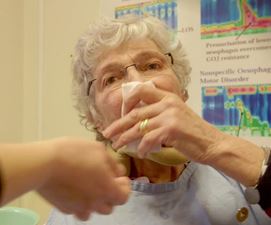
Discoveries of global significance have seen two research teams from Flinders University become finalists in this year’s high-profile Australian Eureka Prize science awards.
The School of Medicine AIM Analysis Collaboration and an international mass extinctions research collaboration involving the School of Biological Sciences Palaeontology Laboratory are the Flinders finalists in two key categories of the 2016 Australian Museum Eureka Prizes, the winners of which will be announced in Sydney on 31 August.
AIM Analysis Collaboration (finalist in Innovation in Medical Research category): A Flinders University and SA Health team started developing the system for helping dysphagia patients about seven years ago. Project leader, NHMRC Senior Research Fellow Associate Professor Taher Omari, says the AIM software allows clinicians to rapidly assess patient swallowing at the bedside.
“Within the context of age and illness, the clinician can more accurately implement the patient’s management and improve their outcomes,” says Associate Professor Omari, from the School of Medicine’s Human Physiology, Medical Science and Technology.
“The technique has worldwide application because in Australia alone about 4% of the population have some degree of swallow disorder, from the aged, to stroke and cancer patients.”
The project includes research collaborators at the University of NSW, University of Christchurch in New Zealand, University of Madison in the USA and Universities of Orebro and Leuven in Europe.
The team based at Flinders Medical Centre includes Associate Professor Omari, Associate Professor Phil Dinning, Professor Robert Fraser, Dr Richard Heddle, Ms Carly Burgstad, Ms Lisa McCall, Dr Charles Cock, Ms Lara Ferris, Dr Sebastian Doeltgen, Mrs Alison Thompson and Mrs Mistyka Schar (as pictured).
Trace Elements in Past Oceans Project (finalist in the 2016 Eureka Prize for Excellence in Interdisciplinary Scientific Research): Flinders Strategic Professor in Palaeontology John Long is involved in the second Eureka Prize finalist team.
Professor Long joined forces with a specialist team led by Professor Ross Large at the Australian Research Council Centre of Excellence in Ore Deposits at the University of Tasmania in a ground-breaking new research project.
The Trace Elements in Past Oceans (TEPO) project, with collaborators at Australia’s Institute of Marine and Antarctic Studies, the Russian Academy of Science and University of California, took a multidisciplinary approach to developing a new theory on mass extinctions by analysing the chemistry, geology, palaeontology, evolutionary biology and toxicology based on the trace elements deposited in prehistoric times.
The samples from ancient oceans have been collected by Professor Large’s team over several years.
“It’s been extremely exciting to be part of this project which has taken a bold new step towards understanding the connections between plate tectonics, past ocean chemistry, and the evolution and extinction of life on Earth,” Professor Long says.
Articles by Professor Large and Professor Long about the research findings can be read at The Conversation here and here.
Presented annually, the Australian Museum Eureka Prizes reward excellence in the fields of research and innovation, leadership, science communication and school science. Read more at http://australianmuseum.net.au/eureka

